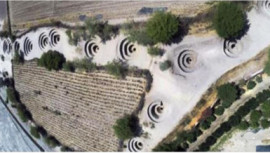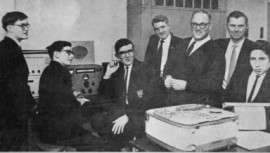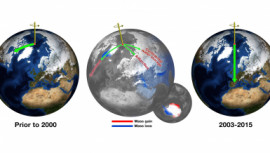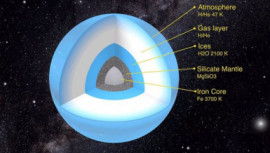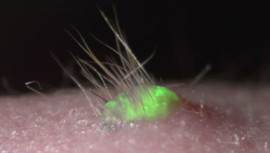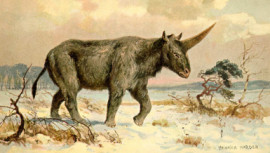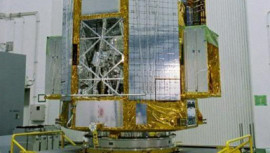-
![Scientists reverse ageing in mice]()
Scientists reverse ageing in mice
Scientists have reversed signs of ageing in middle-aged and elderly...
-
![SpaceX capsule with world's first all-civilian orbital crew splashes down off Florida]()
SpaceX capsule with world's first all-civilian orbital crew splashes down off Florida
The quartet of newly minted citizen astronauts comprising the...
-
![SpaceX capsule with world's first all-civilian orbital crew set for splashdown]()
SpaceX capsule with world's first all-civilian orbital crew set for splashdown
The quartet of newly minted citizen astronauts comprising the...
-
![Bangladeshi water engineer in top 2% of the world scientists]()
Bangladeshi water engineer in top 2% of the world scientists
This list has been prepared by Stanford University by analysing...
-
![What life is like aboard the SpaceX Dragon capsule]()
What life is like aboard the SpaceX Dragon capsule
The first space tourism mission by Elon Musk's SpaceX blasted...
-
![Mars rocks collected by Perseverance boost case for ancient life]()
Mars rocks collected by Perseverance boost case for ancient life
Both samples, slightly wider than a pencil in diameter and about...
-
![NASA confirms Perseverance Mars rover got its first piece of rock]()
NASA confirms Perseverance Mars rover got its first piece of rock
NASA confirmed Monday that its Perseverance Mars rover succeeded in...
-
![Bacteria, and Other Gut Feelings]()
Bacteria, and Other Gut Feelings
Our behaviour may directly affect the bacteria in our gut.
-
![Chinese researchers propose deflecting 'Armageddon' asteroids with rockets]()
Chinese researchers propose deflecting 'Armageddon' asteroids with rockets
Chinese researchers want to send more than 20 of China's...
-
![What Does Asteroid Mining Look Like?]()
What Does Asteroid Mining Look Like?
They brought iron. They wiped off dinosaurs. It’s payback time.
-
![Bezos offers NASA $2 billion in exchange for moon mission contract]()
Bezos offers NASA $2 billion in exchange for moon mission contract
Fresh off his trip to space, billionaire businessman Jeff Bezos on...
-
![Meet Grace, the healthcare robot Covid-19 created]()
Meet Grace, the healthcare robot Covid-19 created
The Hong Kong team behind celebrity humanoid robot Sophia is...
-
![Jeff Bezos' Blue Origin sues NASA over Moon lander contract]()
Jeff Bezos' Blue Origin sues NASA over Moon lander contract
Jeff Bezos' Blue Origin sued the U.S government over NASA'...
-
![AI apocalypse: Will AI replace radiologists?]()
AI apocalypse: Will AI replace radiologists?
Artificial Intelligence, in its simplicity, includes processes that...
-
![3 Bangladeshi researchers named in Asian Scientist 100 list]()
3 Bangladeshi researchers named in Asian Scientist 100 list
Three Bangladeshi researchers have been included in the sixth...
-
![Musk's SpaceX wins NASA's $2.9 billion moon lander contract]()
Musk's SpaceX wins NASA's $2.9 billion moon lander contract
NASA awarded billionaire entrepreneur Elon Musk's space...
-
![Sea slugs lose heads to rid bodies of parasites, Japan researchers show]()
Sea slugs lose heads to rid bodies of parasites, Japan researchers show
Japanese researchers have shown that a type of sea slug are able to...
-
![Elon Musk to offer $100m prize for 'best' tech to capture carbon dioxide emissions]()
Elon Musk to offer $100m prize for 'best' tech to capture carbon dioxide emissions
Tesla Inc chief and billionaire entrepreneur Elon Musk on Thursday...
-
![Elon Musk's Neuralink shows monkey with brain-chip playing videogame by thinking]()
Elon Musk's Neuralink shows monkey with brain-chip playing videogame by thinking
Billionaire entrepreneur Elon Musk's brain-chip startup...
-
![UAE's 'Hope' probe sends home first image of Mars]()
UAE's 'Hope' probe sends home first image of Mars
The UAE's "Hope" probe sent back its first image of...
-
![Bangladesh to get its first space observatory in Faridpur]()
Bangladesh to get its first space observatory in Faridpur
The government is all set to build the “Bangabandhu Sheikh Mujibur...
-
![Mars long ago was wet. You may be surprised where the water went]()
Mars long ago was wet. You may be surprised where the water went
Mars was once a wet world, with abundant bodies of water on its...
-
![Rich countries fall short in sciences gender equality: UNESCO]()
Rich countries fall short in sciences gender equality: UNESCO
Women still face a massive gender bias in science careers worldwide...
-
![Bangladesh-born scientist M Zahid Hasan to receive US Department of Energy award]()
Bangladesh-born scientist M Zahid Hasan to receive US Department of Energy award
The US Department of Energy (DOE) will confer the Ernest Orlando...
-
The ancient Peruvian mystery solved from space
In one of the most arid regions in the world a series of carefully constructed, spiralling holes form lines across the landscape. Known as puquios, their origin has been a puzzle – one that could only be solved from space.
-
Kettering Cosmos: How school children exposed Soviet secret
The Cuban Missile Crisis pushed the world to the brink of nuclear Armageddon and no footprint has yet been left on the Moon. Yet one of the more peculiar twists of the Cold War involved a physics lesson at a provincial grammar school.
-
Loch Ness monster find turns out to be film prop
A marine robot deployed in the waters of Scotland's Loch Ness finds the remains of a monster but it turns out to be a prop from a movie shot in 1970.
-
Scientists now know why North Pole is moving
Scientists thought that they finally came to know the reasons behind the movement of North Pole.It's not terribly unusual for the rotational pole of a planet to shift, especially since the earth is not perfectly spherical. It tends to wobble a little as it spins on its axis, reports Business Insiders.
-
Planet Nine isn't harmful
Astrophysicists outline what Planet Nine might be like - if indeed it exists.
-
Experts caution self-driving cars aren't ready for roads
Self-driving cars are more likely to hurt than help public safety because of unsolved technical issues, engineers and safety advocates told the government Friday, countering a push by innovators to speed government approval.
-
New ransomware knows where you live
A widely distributed scam email that quoted people's postal addresses links to a dangerous form of ransomware, according to a security researcher.
-
Lab-grown skin sprouts hair and glands
Scientists in Japan have successfully transplanted mice with lab-grown skin that has more of the organ's working parts in place than ever before.
-
Scientists may have discovered the fossilised skull of a ‘Siberian unicorn’
For decades, scientists have estimated that the Siberian unicorn -- a long-extinct species of mammal that looked more like a rhino than a horse -- died out some 350,000 years ago, but a beautifully preserved skull found in Kazakhstan has completely overturned that assumption.
-
Japan loses track of $273mn black hole satellite
Dozens of space scientists are desperately scouring the skies after losing track of a quarter-of-a-billion-dollar Japanese satellite that was sent to study black holes.

























